May 20, 2025 | 11:36 GMT +7
May 20, 2025 | 11:36 GMT +7
Hotline: 0913.378.918
May 20, 2025 | 11:36 GMT +7
Hotline: 0913.378.918
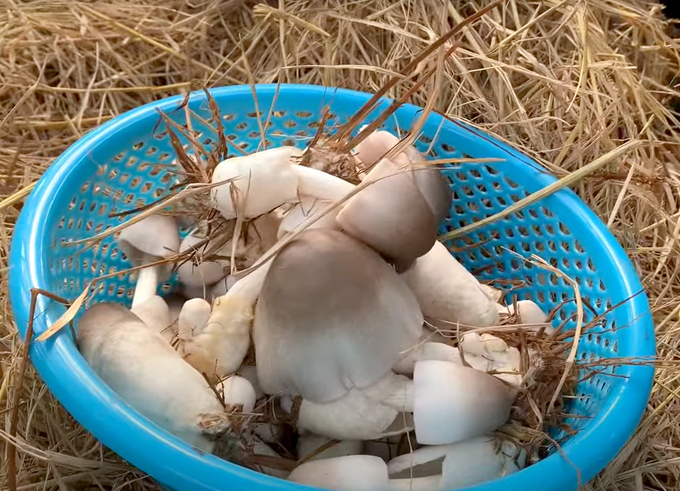
Straw mushrooms are grown from rice straw. Photo: Son Trang.
Mr. Tran Thanh Tuyen, a rice farmer from Vinh Thanh Commune, Chau Thanh District, An Giang Province, has been farming rice for decades. Like other rice-growing households, his main method of disposing of excess rice straw was to accumulate it in tons and burn it on the site following each harvest.
He decided to implement the new practice when agricultural extension officers encouraged him to use rice straw for greenhouse mushroom cultivation instead of burning it, an activity that releases greenhouse gases and pollutes the environment. Mr. Tuyen created six greenhouses on unused family land, each measuring 20 square meters. He accumulates all of the straw after each rice harvest in order to cultivate mushrooms. After subtracting expenses, each product generates a profit of 2 million VND per greenhouse.
In the same district, Mr. Nguyen Thanh Ha realized a new opportunity to utilize rice straw that he had previously burnt. After attending an agricultural extension class, he was inspired and resolved to experiment with the greenhouse mushroom cultivation model that was introduced during the course.
Mr. Ha constructed eight conservatories, each of which spanned 24 square meters, with the assistance of local authorities and his family. His family gathers the straw after each paddy harvest to cultivate mushrooms. According to Mr. Ha, each greenhouse yields approximately 70 kg of straw mushrooms each month. He sells the mushrooms at 100,000 VND per kilogram as a result of his chemical-free production methods. Each greenhouse generates a monthly profit of 3 million VND after subtracting expenses. Mr. Ha has returned his initial investment in two years and is currently expanding his mushroom production, with a total of 24 million VND in monthly revenues from all eight greenhouses.
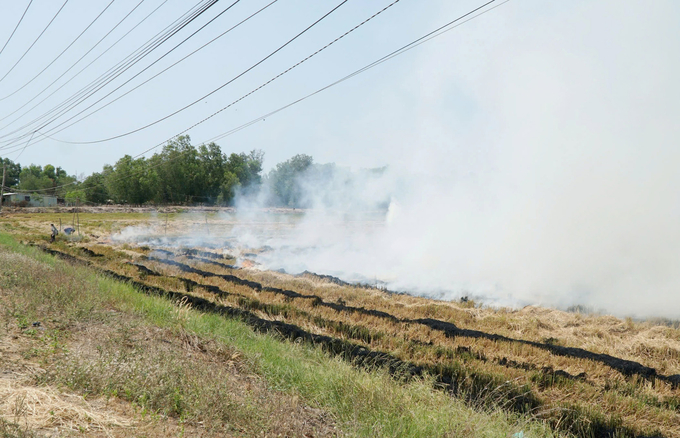
Many farmers are giving up the habit of burning rice fields after being taught how to use straw to grow mushrooms and compost organic fertilizer. Photo: Son Trang.
Ms. Pham Thi Nhu, an officer at the Chau Thanh Agricultural Extension Station, observed that the majority of rice producers in the district previously resolved their rice straw issues by burning it. The agricultural extension team of Chau Thanh initiated an initiative in 2018 to encourage farmers to process rice straw, as they recognized the negative effects of burning.
Agricultural experts who push for sustainable practices have provided assistance in the successful implementation of straw utilization models in Chau Thanh District over the past two years. There are three successful models that the Agricultural Extension Station has implemented: the production of livestock fodder, the composting of organic fertilizer, and the cultivation of mushrooms using rice straw.
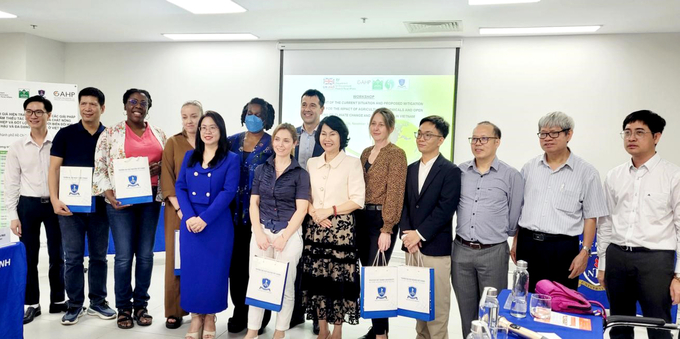
Delegates attending the workshop "Assessing the current situation and proposing solutions to minimize the impact of agricultural chemicals and open burning on climate change and biodiversity in Vietnam". Photo: Son Trang.
In 2022, the "Assessment of Current Status and Proposal of Solutions to Mitigate the Impacts of Agricultural Chemicals and Open Burning on Climate Change and Biodiversity in Vietnam" project was initiated to assist in the reduction of the practice of burning rice straw and agricultural byproducts in Vietnam. The UK's Department for Environment, Food & Rural Affairs (DEFRA) is funding this initiative, which is a collaborative endeavor between the Global Alliance on Health and Pollution (GAHP) and a variety of stakeholders.
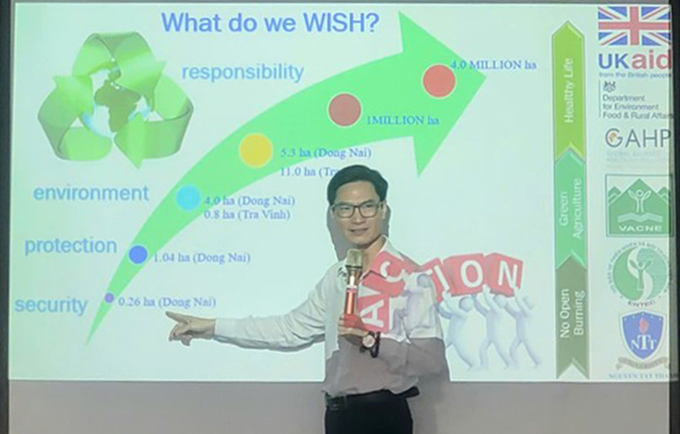
Associate Professor, Dr. Dinh Van Phuc shares about using microbial products to treat straw. Photo: Son Trang.
In the provinces of Tra Vinh, Dong Nai, Ninh Binh, and Thanh Hoa, Nguyen Tat Thanh University (Ho Chi Minh City) has employed post-harvest straw management models in conjunction with microbial products as part of the project.
The use of microbial products to process straw demonstrates numerous advantages, as per Associate Professor Dr. Dinh Van Phuc of the Interdisciplinary Social Science Institute at Nguyen Tat Thanh University. These products not only enhance soil quality by decomposing organic matter, but they also positively impact the growth of aerobic microorganisms in the soil. This is particularly beneficial after intensive cultivation, as it contributes to the preservation and improvement of soil structure and the increase of fertility.
The use of microbial products has demonstrated substantially higher profits in comparison to untreated control fields in terms of economic efficiency. For instance, in Tra Vinh during the summer-autumn season, the profits of fields that utilized microbial products exceeded 22 million VND, which is 4 million VND more than the profits of control fields.
Notably, producers gain significant health benefits from the processing of straw with microbial products. In the past, farmers would burn straw after each rice harvest, resulting in the production of dense smoke and dust. This, in turn, caused respiratory issues, including persistent coughing, as per Dr. Dinh Van Phuc. Farmers are no longer required to fire fields, which has resulted in a substantial decrease in respiratory illnesses, as a result of the adoption of microbial products for straw management. Furthermore, the use of microbial products reduces the necessity for herbicides, thereby further protecting the health of producers.
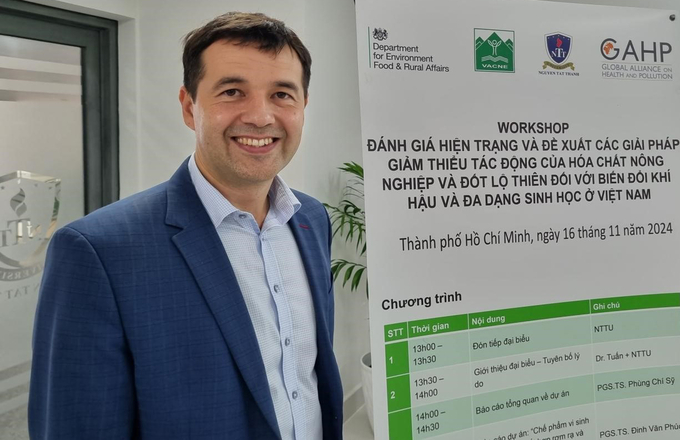
GAHP Coordinator Mr. Petr Sharov. Photo: Son Trang.
GAHP Coordinator Mr. Petr Sharov acknowledged the biggest challenge faced by the project: the lack of awareness about the harmful effects of burning rice straw and agricultural byproducts. "This is precisely the issue our project aims to address," he said. "While we cannot completely resolve the problem at this stage, we have made important initial progress. I firmly believe this work must continue, especially efforts to engage with communities, educate people, and raise awareness."
Translated by Linh Linh

(VAN) For years, the CRISPR-Cas9 genome technology has been reshaping genetic engineering, a precision tool to transform everything from agriculture to medicine.

(VAN) Vietnam aims to become a 'leader' in the region in the capacity and managing effectively soil health and crop nutrition.
![Reducing emissions from rice fields: [Part 1] Farming clean rice together](https://t.ex-cdn.com/nongnghiepmoitruong.vn/608w/files/news/2025/05/05/z6509661417740_a647202949c539012a959e841c03e1d3-nongnghiep-143611.jpg)
(VAN) Growing clean rice helps reduce environmental pollution while increasing income, allowing farmers to feel secure in production and remain committed to their fields for the long term.
/2025/05/19/5136-1-144800_230.jpg)
(VAN) The Nghe An Provincial People's Committee has just approved the list of beneficiaries eligible for revenue from the Emission Reductions Payment Agreement (ERPA) in the North Central region for the year 2025.

(VAN) 14 out of 35 domesticated elephants in Dak Lak province have had their living conditions improved, with 11 of them currently participating in the non-riding elephant tourism model.

(VAN) Muong Nhe Nature Reserve hopes that being upgraded to a national park will lay the foundation for forest protection efforts to be carried out in a systematic, modern, and sustainable manner.
/2025/05/16/3923-2-171845_52.jpg)
(VAN) Lower costs, higher yields, and improved soil quality are outstanding benefits that soybeans bring when integrated into the crop rotation system.